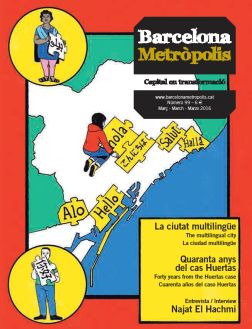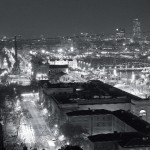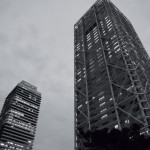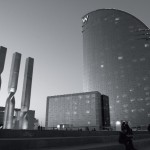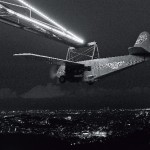From left to right, the Barcelona seafront as seen from Miramar, the towers at the end of carrer Marina, Hotel W Barcelona or Hotel Vela, and the captive aeroplane at Tibidabo amusement park.
Photos: Albert Armengol.
El día del Watusi [The day of Watusi], the monumental work by Francisco Casavella, can be read as a great novel of the Spanish transition to democracy or as a story of “why we have gone from being a dramatic country to being a stupid country”. Above all, however, it is a novel about the conflict between the individual and himself, and between mortal beings and immortal inventions.
August 1971. The body of Watusi sways in the water in the port of Barcelona. It looks like a white and blue animal, dull and pale. They had shaved him, taken his shoes and his trousers, but left the baseball jacket with the W and the words “Watusi 65” sewn on the back. So begins the monumental novel El día del Watusi (The day of Watusi), by Francisco Casavella, which has been recently, and wisely, republished by Anagrama. Today, a hotel has been erected on the old demolished dam, in the same place where the cadaver of that mysterious criminal, philosopher and dancer appears in the novel. The hotel is also crowned with a W, and from it you can make out the skyline of Barcelona, which Francisco Casavella chose as the setting for one of his most ambitious works. El día del Watusi can be read as a great novel of the Spanish transition to democracy or as a story of “why we have gone from being a dramatic country to being a stupid country”. Above all, however, it is a novel about the conflict between the individual and himself, between power and survival, and between mortal beings and immortal inventions.
“I don’t know if you’re aware, but Catalans make bread out of stones. Give me a barren plot and I’ll turn it into the land of legend in a flash,” said Casavella. Thus the literary skyline was revealed, in a city hemmed in between the sea, two rivers and a mountain chain, a city where “in relentless downward progression, you can go into a spiral of impoverishment until you end up living in the unhealthy maritime district and selling matches on the corners where the sad song of the accordion plays”. A Barcelona at the foot of Montjuïc, where the last shacks in which the protagonist of El día del Watusi was raised coexist alongside the vestiges of a long-gone International Exposition – abandoned palaces, mansions lost among the trees and a ruined Olympic stadium – as if an elusive Antiquity were surviving on that mountain or it was all “a remnant of shadow dreamed up by a delinquent Plato”. A city whose inhabitants live beneath the looming danger of falling, since, in the city of Watusi, moving five streets up was clear progress and doing the opposite meant the loss of prestige; people clambered upwards to gain a foothold on the sides of the hill of Tibidabo, something like the promised land.
15 August 1971 marks the way the novel’s protagonist, Fernando Atienza, sees the world, when in the wake of the floating cadaver of Watusi, he discovers that all the city’s stories empty into the sea. And from that day of Watusi onwards, Fernando will be witness to the transformation of the world around him – “Be careful how you look at the world, because the world is going to be how you look at it,” goes the maxim that best explains the paranoia. He recounts this when, in January 1995, on Epiphany, at a charity event held on Tibidabo by a well-known, recently-jailed financier, he is commissioned to produce a confidential report on a character shrouded in murky secrets. A report to the reader covering everything from the last gasps of Franco’s dictatorship to that moment when Spanish democracy – or at least a certain naïveté that went along with the transition to democracy – faltered among political and financial scandals led by beings with a thousand faces and an aura that is maverick and criminal, or simply grotesque. It is easy and also hilarious to give faces to the novel’s characters – bankers, politicians who have just discovered democracy, colourful converts and upstarts of all shapes and sizes – who are protagonists of an era in which forgetfulness was promoted as a value and no one was ashamed of their amnesia.
Casavella’s novels are not realist, however, because history is the most perfect fiction through plausibility or the most imperfect through implausibility, and the protagonist of El día del Watusi had to survive on that inclined plane of the city – on the skyline marked by the mountain of the poor and that of the rich, where it is easy to tumble downhill – rubbing shoulders with his old neighbours from the shacks and with the bourgeoisie protected by the local banking community, which, given the imminent elections, was creating political groups to adapt to the new framework of power. And Fernando Atienza – who as a post-modern rogue has known pain, tragedy, the certainty that everything is an illusion and that nothing is serious in the end – will rationalise, with the story of his existence, the reasons behind that transformation, as he knows the world will always tell the individual “what it thinks you should know and it will always give you what it thinks you should want, but the individual will never get what he wants to get and will never hear what he wants to know”. That is the wisdom that pervades El día del Watusi and that Casavella was able to convey in his first novel, El triunfo [The triumph], which he used to open a majestic narrative parabola that was cut off too soon with his death following the publication of Lo que sé de los vampiros [What I know about vampires].
Barcelona’s skyline, however, has changed since then. The Olympic Village reshaped its outline, new antennae appeared on the sides of its surrounding hills, as did new, unique buildings, and the towers of the Sagrada Familia continue to grow in height and in horror at a faster pace now that they are feeding off the tickets paid for with tourist cash. What times those were, the times of Watusi, when the expiatory temple grew with the prudent contributions from the annual charity collections from Barcelonians! “Now we have five towers! Now we have six!” exclaimed the population enthusiastically before that unfinished delirium.
The church crowning Tibidabo is also expiatory. Sitting among attractions and automatons, the ascending course of the building from the crypt to the Christ that tops it reflects the desire to wipe away blame and be purified through sacrifice. Or it simply reflects the inclined plane of the city of Watusi. At the doors to the church, a red airplane held captive by its axis, condemned to eternal expiation, flies above the city. The mythical “Lío Grande de la Playa” can be spied from its windows, the meeting of mobsters on the beach, dancing to the sound of Black is Black by Los Bravos, until sinking into the sand, or the attack on the central bank that coincided with the theft of a ham at La Boqueria market that the junkies resold for a few cents on La Rambla – events that readers of El día del Watusi will never forget and that now form part of urban legend.
The legendary places of literature – Juan Marsé’s Barcelona, Juan García Hortelano’s Madrid, William Faulkner’s Yoknapatawpha, and, of course, the Barcelona of Watusi – are not just locations in an imaginary atlas. For Casavella, the usefulness of the novel, of telling stories is, above all, rekindling tired words like memory, justice, corruption, illusion or defeat. And the writer that wants to tell a story must break down borders, lift up planes and give new names so that a more vigorous fiction can compete with that other fiction that power and idleness pass off as truth. This way, the Barcelona of Watusi survives urban planning messes and gentrification, like the legendary lands of the great novelists, and would even withstand bigger natural catastrophes. Because only great novelists have the power to urbanise the imagination, and so they are even greater than the legends. And thus Casavella, when asked about how he identified with Watusi, said, “Dancing, I dance better. Killing, I kill badly. Philosophising, I avoid. To die, I refuse”.



